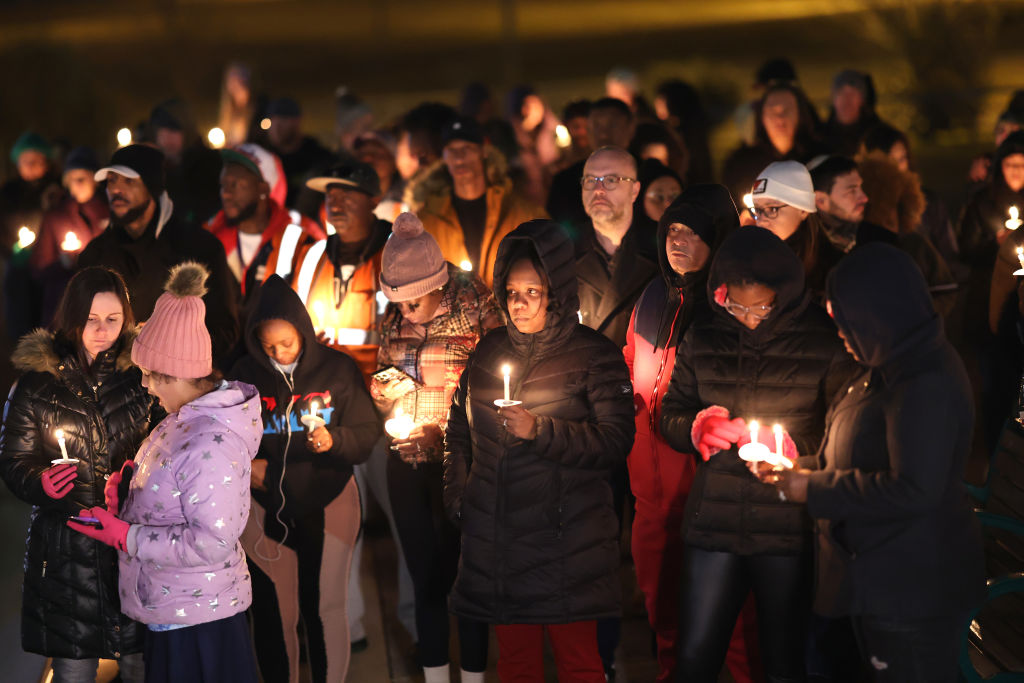Happy Tuesday! Best of luck to Western Australia’s Department of Fire and Emergency Services, which is currently in the process of trying to track down an 8-millimeter-long capsule containing radioactive material. It fell off a truck two weeks ago, and could cause serious bodily harm to anyone who touches it.
Don’t worry, authorities have narrowed the search down to a 900-mile stretch of highway between Perth and Pilbara.
Quick Hits: Today’s Top Stories
- The White House announced Monday it would end the national and public health emergencies related to the COVID-19 pandemic on May 11, as the House prepares to vote on resolutions in favor of terminating both later this week. The Biden administration argued a May 11 end date would give the health care system time to prepare for the regulatory changes that will kick in when the emergencies end, while Republican lawmakers are adamant the “emergency” phase of the pandemic ended months or years ago. Biden told “60 Minutes” in September that “the pandemic is over.”
- The Food and Drug Administration announced Friday it was weighing removing restrictions on gay and bisexual blood donors originally implemented during the 1980s HIV/AIDS crisis, replacing them with a new donor screening that’s individualized and based on recent sexual activity. A requirement to test all donated blood for disease would remain in place, but the changes reflect a need to “maintain an adequate blood supply,” said Peter Marks, the director of the FDA’s Center for Biologics Evaluation and Research. The proposal will be open to public comment for 60 days.
- The Food and Drug Administration announced Friday it was stripping Evusheld—AstraZeneca’s monoclonal antibody drug used to treat COVID-19—of its emergency use authorization due to its ineffectiveness against the currently dominant XBB.1.5 Omicron subvariant.
- Utah’s GOP Governor Spencer Cox signed a bill into law over the weekend banning gender-transition surgeries for minors and limiting access to hormone treatments for young people in the state. The legislation also requires the state’s Department of Health and Human services to perform a “systematic review” of the treatments and present its findings to the state legislature.
- In a report released Friday, the Organization for the Prohibition of Chemical Weapons concluded the Bashar al Assad regime was responsible for a chlorine attack in Douma, Syria, in April 2018. The finding was based on 66 witness interviews, 70 chemical samples, and additional forensic evidence and blamed the Syrian Arab Air Force for dropping the chemical. The U.S., U.K., and France responded to the attack, which killed at least 43 people, with missile strikes against the Syrian government in the same month.
- More than 90 people were killed Monday in a likely suicide bombing at a mosque in Peshawar, Pakistan, near the northwest border with Afghanistan. A small faction of the Pakistani Taliban, Tehreek-e-Taliban Pakistan, claimed responsibility for the attack—which took place at around 1:30pm local time, during afternoon prayers—but the main branch of the Pakistani Taliban denied any involvement.
- President Joe Biden appeared on Monday to deny a Ukrainian request for F-16 fighter jets, telling reporters, “No,” when asked if the U.S. would provide the planes. Andriy Yermak, a high-ranking Ukrainian official, suggested Poland might be open to sending some of its jets. Polish Prime Minister Matusz Morawiecki said Monday that any decision to send F-16s would be made “in consultation with NATO countries.”
- The Financial Times reported Monday the Biden administration would block U.S. companies from selling most products to Chinese telecoms company Huawei by pulling export licenses. The new policy represents the next step toward banning all U.S. technology sales to the Chinese tech giant the U.S. government says helps spy for the Chinese government.
- Bobby Hull—NHL Hall of Famer and Stanley Cup winner—died Monday at 84. He played for the Chicago Blackhawks from 1957 to 1972 and scored a franchise record 604 goals for the team.
“Mom! Mom! Mom!”

Tyre Nichols, 29, liked skateboarding, worked at FedEx, and posted pictures on Facebook of his four-year-old son. After moving from California to Memphis, Tennessee a few years ago, he continued his photography hobby, capturing train tracks, bridges, and historic Beale Street. “Photography helps me look at the world in a more creative way,” he wrote. “It expresses me in ways I cannot write down for people.”
On January 7, Nichols was on his way home from taking sunset pictures at a Memphis park, according to his family, when police pulled him over. Body and street camera footage of the encounter released Friday evening shows an officer approaching the car with his gun raised and another pulling Nichols out of his vehicle. “I didn’t do anything,” Nichols said as officers wrestled him down, one yelling at others to taser him. Officers demanded he show them his hands even after they were restrained and ordered him to get on the ground when he was already prone—then escalated their threats when he didn’t understand or couldn’t comply with their often contradictory directives. Nichols told them, “I’m just trying to go home.”
Worth Your Time
- On the 90th anniversary of Adolf Hitler being sworn into power, Samuel Gregg tells the story of Wilhelm Röpke, a classical liberal who stood up to Nazis in his native Germany. “Hitler never made any secret of his intention to strike against those he saw as his enemies once his grip on power had been consolidated,” Gregg writes in Law & Liberty. “It was thus at considerable personal risk that a young German economics professor delivered a public lecture in Frankfurt am Main, just eight days after Hitler took office, in which he made clear his opposition to the new government. Wilhelm Röpke was already known as an outspoken critic of Nazism. He had even personally campaigned against the Nazi Party. ‘You will be complicit,’ he wrote in one 1930 election pamphlet, ‘if you vote Nazi or for a party that has no reservations about forming a government with the Nazis.’ That pointed ‘or’ was a shot at those conservative political and military elites who, three years later, would allow Hitler into office under the illusion that they could control him.”
- Fiscal conservatives shouldn’t threaten to default on the national debt because “the hostage cannot be shot,” longtime GOP budgetary wonk Brian Riedl argues in National Review. “Default would bring economic chaos and—even if one considers that as an acceptable price for fixing the long-term budget—bring a voter backlash that sabotages and ultimately fails to bring budget savings,” he writes. “Voters are much more likely to accept budget savings that are presented as commonsense, responsible, and non-disruptive. A successful message focuses on the spenders driving permanent trillion-dollar deficits, elevated interest rates, and Social Security and Medicare insolvency. They are burying Washington in red ink that is pushing us toward a financial crisis and chaos. Reining in deficits is responsible, affordable, and prudent. Yes, the debt limit must be raised, but both parties used to agree that spending savings should accompany these debt-limit hikes. Violating this longstanding norm risks chaos, instability, and economic disruption.”
- In a piece worth checking out as much for the beautiful images as for the words, Doug Perrine shares his experiences researching and photographing humpback whales, who, he says, like to play with bubbles. “In over three decades of observing and photographing humpbacks, and participating in research projects,” he writes for Hakai Magazine, “I’ve also observed these creative and adaptive whales using bubbles in various ways in different situations—some of which were previously unreported. I’m tempted to describe the air in a humpback’s lungs as a Swiss army knife because I’ve seen whales do so many different things with it. It is not actually a tool collection though, but a storehouse of raw construction material with which the whale can fashion a variety of tools. Lacking free fingers and opposable thumbs, whales are unable to create and use tools in the same way as humans, but reveal their intelligence through the manner in which they utilize other body parts for tool production and use.”
Presented Without Comment
Also Presented Without Comment
Also Also Presented Without Comment
Toeing the Company Line
- On the 300th episode of Advisory Opinions, Sarah and David wade through some of the latest, most migraine-inducing attempts to stomp, quell, restrict, and penalize free inquiry and expression. If you’ve been feeling too optimistic about the state of free speech lately, this podcast’s for you.
- In the inaugural edition of Dispatch Politics, Andrew, David, and Audrey recap the contentious race for RNC chair and share a sit-down with former Secretary of State Mike Pompeo—a likely GOP presidential hopeful—about classified documents and his new book. “Pompeo did concede to conducting a sweep at some point to make sure he did not have any classified documents left over from his tenure running the State Department and the Central Intelligence Agency,” they write. “‘I’ve looked. I don’t think I have any classified documents,’ he said.”
- Andrew, Drucker and Audrey will join Steve tonight at 8pm ET for another members-only Dispatch Live, where they’ll talk about the newly-launched newsletter and this chaotic and consequential political moment it’s designed to cover. Keep an eye out for an email today with additional details and come with any questions you’d like to discuss with the crew.
- Perhaps inspired by last Thursday’s TMD, Kevin devotes this week’s Wanderland (🔒) to exploring why Turkey is still a NATO member. “Recep Tayyip Erdoğan has been pursuing this NATO-hamstringing policy for a good long while now, and there is no reason at this point to suppose he doesn’t mean to keep it up,” he writes. “It is entirely sensible to ask the question of whether Turkey is going to make this an ‘us or them’ issue.”
- In Monday’s edition of Boiling Frogs (🔒), Nick outlines three ways the GOP could move past Donald Trump. Two are already off the table, but “the third option is the one that is, technically, within the party’s power to deliver,” he writes. “That would involve the 2024 field clearing and uniting behind a single formidable challenger to Trump, presumably DeSantis. In this case, however, the GOP’s problem isn’t cowardice but hubris.”
- On the site today, Kevin responds to Nicholas Kristof’s recent piece on gun ownership and John Gustavsson pilots a plan to let Americans know where their tax dollars are going.
Let Us Know
If you were Memphis Police Chief Cerelyn Davis, what specific reforms would you implement to ensure nothing like what those officers did to Tyre Nichols a few weeks ago happens again?
What—if anything—would you propose if you were a member of Congress?






Please note that we at The Dispatch hold ourselves, our work, and our commenters to a higher standard than other places on the internet. We welcome comments that foster genuine debate or discussion—including comments critical of us or our work—but responses that include ad hominem attacks on fellow Dispatch members or are intended to stoke fear and anger may be moderated.
With your membership, you only have the ability to comment on The Morning Dispatch articles. Consider upgrading to join the conversation everywhere.